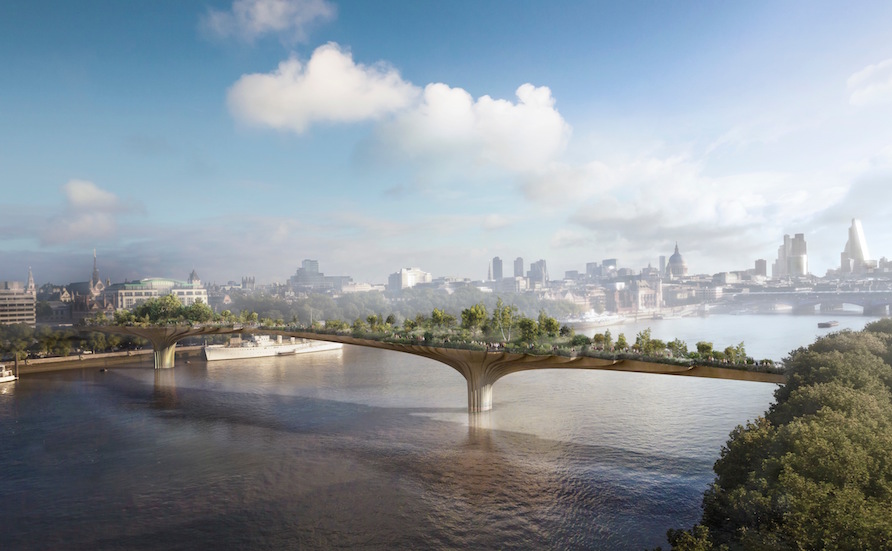Transportation
London Mayor Pulls Plug on Garden Bridge Project
Backers were unable to secure private funding for Thomas Heatherwick's $255-million green scheme

Rising costs and maintenance projections doomed Heatherwick’s fanciful scheme. Photo: courtesy of ARUP
London Mayor Sadiq Khan on April 28 withdrew support for the River Thames Garden Bridge project, effectively killing the $255-million job. Though promoted privately, some $50 million of public money has been sunk in the project and more is at stake.
The mayor’s decision not to underwrite the estimated $3.8-million annual maintenance cost for decades ahead, should the Garden Bridge Trust (GBT) fail to secure sufficient private funds, doomed the scheme. Without the guarantee, London’s port authority and the boroughs at either end of the bridge have so far refused required approvals.
“I am simply not prepared to risk a situation where the taxpayer has to step in and contribute significant additional amounts to ensure the project is completed,” says Khan. Under the previous mayor Boris Johnson, “a considerable amount of London taxpayers’ money has already been spent.” Rising construction costs and “doubts around funding the maintenance of the bridge” are among reasons he cites.
GBT Chairman Mervyn Davies said: "We received the Mayor's letter with great regret today. We will study the contents of the letter in detail before responding formally.”
In making his decision, Khan followed advice in report he commissioned last October from Margaret Hodge, a senior member of parliament. “It is better for the taxpayer to accept the loss than to risk the additional demands if the project proceeds,” she concluded. Cancellation costs could raise taxpayer’s loss on the project to nearly $60 million.
To act as a garden over water, the roughly 368 m long structure in central London would have a deck widening to 30 meters at two locations. Supporting up to 2 m of soil on its 172 m main span, the deck depth would reach 6 m at the piers. The deck top would be sheeted with stainless steel. Its sides and large fluted concrete piers would be enclosed in cupronickel.
Since first promoted by locally-based designer Thomas Heatherwick and popular actor Joanna Lumley, the bridge’s projected cost has risen from $77 million to around $255 million. So far, GBT has secured only $88 million in private funding pledges.
Though the scheme had many opponents, including the elected London Assembly, Boris Johnson and the government’s chief finance minister George Osborne committed $38 million each in 2015. Two thirds of the city’s contribution was later converted to a loan.
After securing public funding, GBT hired Paris-based Bouygues Travaux Publics S.A., with Italy’s Cimolai S.p.A., Pordenone, for preconstruction services. In March 2016, GBT signed a fixed price contract for detail design and construction with the firms, without having secured all the financing.
By allowing the contract to be signed before financing and approvals were in place, city officials were responsible for “taking substantial risks”, says Hodge. “The decision seemed to be driven by electoral cycles rather than good project management”.
GBT says the fixed price, lump sum contract signing “allowed the contractor to engage a larger workforce to ensure all planning conditions were met in the timescale, thereby reducing the risk of cost escalation”. And the contract included “exit points.” The project has been at a standstill since last summer, says a spokeswoman.
While Hodge doubts GBT’s ability to raise the required funding, her criticisms also focus on the project’s procurement by the city, under Boris Johnson’s instructions. Johnson declined to take part in her review.
TfL launched bidding for bridge design services in February 2013 and awarded contracts to Heatherwick Studios (HS) and Arup Group Ltd., London, that March and July respectively.
HS beat competition from two firms despite having substantially less bridge experience and requiring a higher fee, notes Hodge. Neither rival firm “knew of the existence of Heatherwick Studio’s design for a Garden Bridge,” she notes. HS later became Arup’s sub consultant.
Among firms competing for the engineering design contract, only Arup was invited by the city to reduce its fee bid. Hodge says she “found no evidence to suggest that Arup was aware that they had been singled out”. By the time Arup’s contract was transferred to the GBT in April 2015 it had earned $10.8 million from TfL, notes Hodge.
GBT’s Davies rebutted various aspects of the Hodge’s findings, which showed “disregard for the facts and been selective in her use of evidence to support her own opinions,” he said.



